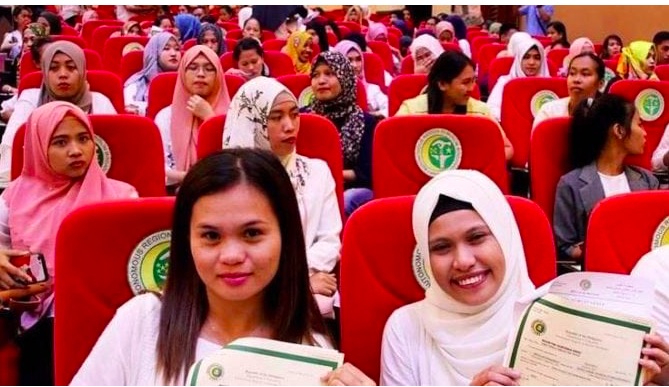… EDUCATION FOR PEACE …
An article by John Unson for Philstar Global, as reprinted by the Global Campaign for Peace Education
Some 6,000 teachers deployed in five southern provinces in the past five years are now actively helping propagate interfaith solidarity among schoolchildren in support of the government’s Mindanao peace efforts.
They are now handling classes in remote barrios in the Autonomous Region in Muslim Mindanao covering Maguindanao and Lanao del Sur, both in mainland Mindanao, and in the island provinces of Basilan, Sulu and Tawi-Tawi.

New ARMM public school teachers show their appointments signed by the region’s chief executive, Gov. Mujiv Hataman. (Photo: Philstar.com / John Unson)
Lawyer Rasol Mitmug Jr., ARMM’s regional education secretary, said Friday the latest batch of duly licensed public school mentors enlisted by his department is comprised of 765 men and women who had signed commitments to accept teaching assignments in far-flung schools.
(Articles continued in right column)
Can peace be achieved in Mindanao?
Where is peace education taking place?
(continued from left column)
More than 4,000 teachers were appointed by ARMM Gov. Mujiv Hataman during the time of Mitmug’s predecessor, John Magno, who was at the helm of the regional education department from late 2015 to 2017.
They filled out vacancies after the removal by the Hataman administration of thousands of “ghost teachers” from the payroll of the Department of Education-ARMM that proliferated during the time of past regional governors.
“Some of them showed their dedication and commitment when they volunteered to help facilitate the barangay and Sangguniang Kabataang elections last month,” Mitmug said.
He said the teachers are now helping propagate the so-called “culture of peace” and religious solidarity among ARMM’s Muslim and Christian communities.
The ARMM education and public works department were touted as the most corrupt agencies of the regional governments under past administrations.
Officials of the two agencies now openly talk about efficiency in handling of quarterly operating funds from the national coffer, open to scrutiny by media entities and peace advocacy blocs helping improve regional governance through various capacity-building interventions.
(Thank you to Janet Hudgins, the CPNN reporter for this article.)